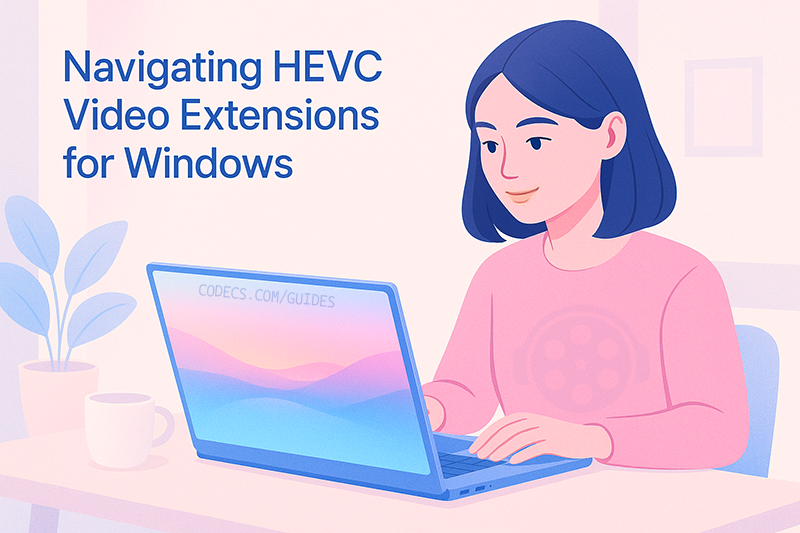In the fast-moving world of digital video, staying current means dealing with a constant stream of new file formats, compression methods, and compatibility headaches.
One format that keeps popping up - especially in 4K and mobile video - is High Efficiency Video Coding, or HEVC (also known as H.265). It’s powerful, efficient, and increasingly everywhere… except sometimes where you need it most: your Windows PC.
Getting HEVC support on Windows can be confusing, with several extension types and workarounds available.
Here's a clear look at your options, and how to choose the right HEVC Video Extension for your needs.
Let’s start with a name that won’t win any branding awards: “HEVC Video Extensions from Device Manufacturer”
Not exactly catchy, but for many Windows 10 and 11 users, especially on older or OEM-preloaded systems - it’s the quiet fix that just works.

This extension often comes pre-installed by your device manufacturer and unlocks seamless HEVC (H265) playback without needing to buy or manually install anything from the Microsoft Store.
The catch? It’s not always easy to find again if it’s uninstalled, and it won’t show up in a typical search. In other words, if you have it, keep it.
Initially accessible through the Microsoft Store, its removal from the storefront raised questions about its broader compatibility and Microsoft's motives.
What is HEVC and Why It Matters
HEVC is used for streaming services (Netflix, Prime Video), 4K UHD Blu-ray discs, iPhone camera recordings, drone footage, and modern video editing workflows.
It compresses video twice as efficiently as H.264, saving space and bandwidth.
However, Windows support for HEVC varies by version - many users get errors like “video not supported” or “missing codec” when trying to play H.265 files.
Does Your Windows Version Support HEVC?
Use the table below to see if your version of Windows has built-in HEVC support or requires installation.
💻 HEVC Compatibility by Windows Version
| Windows Version | HEVC Support |
|---|---|
| Windows 10 ≤ 1703 | Built-in |
| Windows 10 1709+ | Requires Microsoft Store extension |
| Windows 11 ≥ 22H2 | Built-in (most devices) |
Enter the "HEVC Video Extensions", a paid app available for a nominal fee of 99 cents.
The HEVC Video Extensions app remains the official way to enable H.265 playback on Windows, supporting both hardware-accelerated and software decoding based on your device capabilities.
It integrates smoothly with native Windows apps and Microsoft Edge, ensuring reliable playback out of the box.
However, browser support for HEVC is still mixed.
While Microsoft Edge offers consistent hardware-accelerated playback, Google Chrome and other Chromium-based browsers vary widely depending on system hardware, OS version, and browser updates.
This leads to an inconsistent experience for many users.
To bypass these limitations, some advanced users turn to custom Chromium forks or modified browsers that include unofficial HEVC support - allowing playback without Microsoft’s extension.
However, such versions may pose security risks and licensing concerns, so caution is advised when using unofficial builds.
HEVC Licensing, Legal Risks, and Why Microsoft Charges for It
HEVC isn’t just a powerful codec - it’s a legally complex one. The HEVC licensing landscape is tangled, with multiple patent pools and usage rights involved.
This complexity has led to serious legal cases, including a ruling against Netflix for patent infringement related to HEVC playback.
→ See Court Finds Netflix Guilty of HEVC Patent Infringement
Because of this, Microsoft likely charges a small fee for the HEVC Video Extensions to cover licensing costs and avoid legal exposure.
It’s also why unofficial solutions - while tempting - can be risky. Some open-source or “free” HEVC builds may violate licensing terms or even contain spyware or malicious code.
For most users, Microsoft’s official app offers a reliable and safe way to unlock HEVC support - at a minor cost, but with peace of mind.
Free Alternatives: Play HEVC Without Extensions
If you don’t want to use the Microsoft Store at all, these free HEVC-compatible players are your best bet:
-
VLC Media Player → Open-source and supports HEVC out-of-the-box.
-
PotPlayer → Advanced features and hardware acceleration.
-
MPC-HC + K-Lite Codec Pack → Great for legacy systems.
AV1: A New Codec, But HEVC Still Holds Ground
The newer AV1 Codec, developed by the Alliance for Open Media, promises better compression and royalty-free use - and it’s backed by major players like Google and Microsoft.
→ Download AV1 Codec
But with limited hardware support and slower encoding speeds, AV1 adoption on Windows remains gradual. → Check How to Play AV1 Videos on Windows 11















MPC-BE vs MPC-HC: Which Media Player is Right...
MPC-BE the best for me! Better performance than mpc-hc
Read More →How to Download HEVC Video Extension for Free
THANKS BRO IT WORKS
Read More →Convert WAV to MP3: Best Quality Settings Gui...
MP3, AAC is only for vintage H/W players. For PC: FLAC. For smarphone: Opus 96~160 kbit/s
Read More →